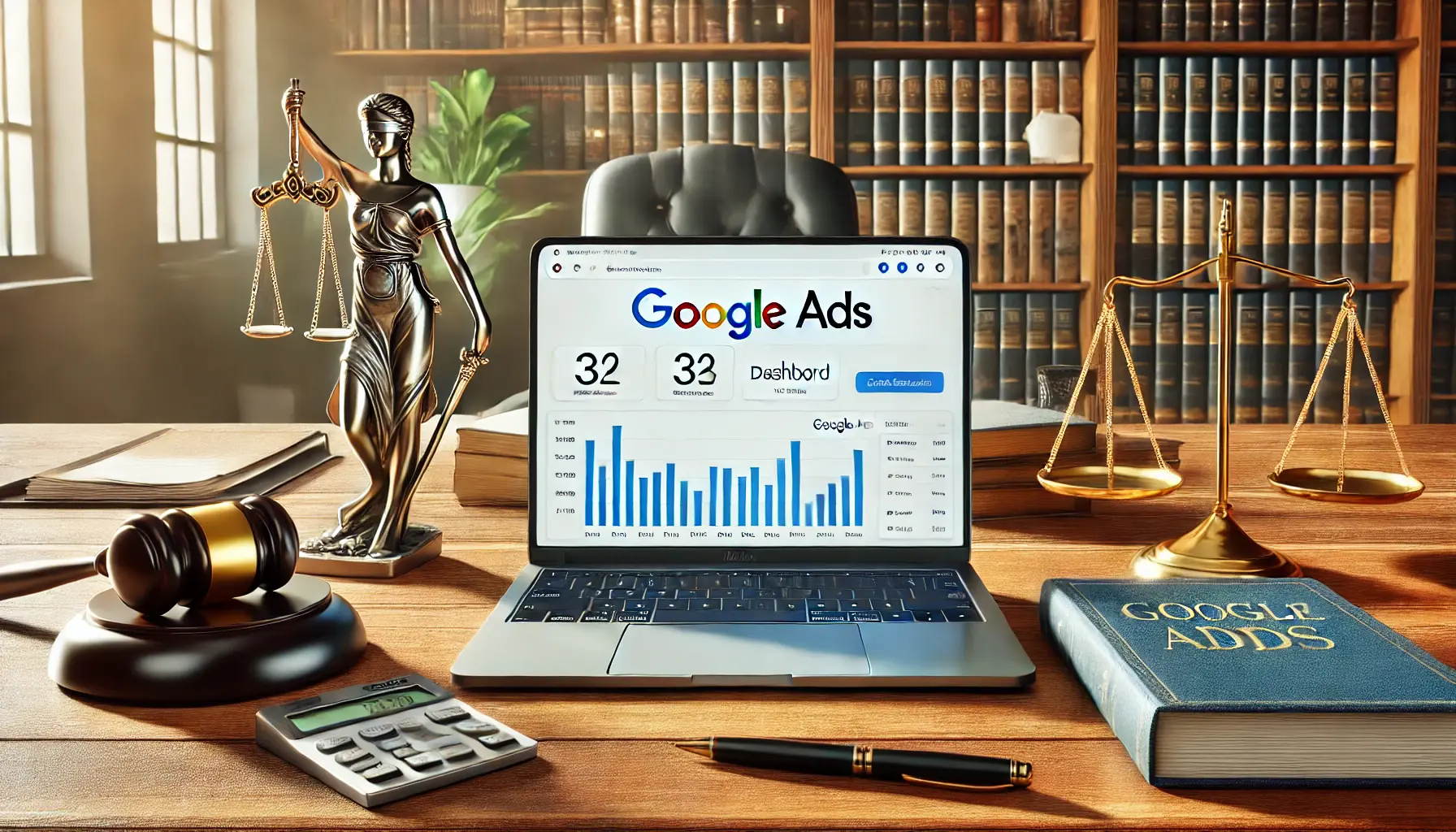Standing out in the crowd is one of the biggest challenges a lawyer or law firm faces in this competitive world of legal services.
With the ever-growing dependency on digital platforms, Google Ads has become a highly influential way to help lawyers reach more potential clients.
If you are still thinking about how Google Ads for lawyers can make any difference, then this article is a comprehensive guide on its benefits and implementation strategies.
By leveraging targeted campaigns, lawyers can connect with individuals actively searching for legal services.
But the key lies in knowing how to use Google Ads strategically to maximize results and stay ahead in the digital race.
Let’s explore the ins and outs of Google Ads tailored for the legal sector, starting with the basics of what it entails and how it benefits lawyers.
- Understanding Google Ads for Lawyers
- Setting Up Effective Google Ads Campaigns
- Optimizing Google Ads Performance
- Ethical and Legal Considerations in Lawyer Advertising
- Case Studies: Successful Google Ads Campaigns for Law Firms
- Why Google Ads is Revolutionary for Lawyers
- Frequently Asked Questions About Google Ads for Lawyers
Understanding Google Ads for Lawyers
Google Ads is a pay-per-click (PPC) advertising platform where law firms can showcase their ads on Google’s search engine and partner websites.
This provides lawyers with visibility in areas where potential clients are actively searching for legal services.
Google Ads for lawyers is an effective way to connect with clientele across different fields, such as personal injury attorneys and family lawyers.

Google Ads provides a platform for targeted digital advertising, ensuring visibility on search results.
What Are Google Ads?
Google Ads operates on a bidding systemA process in online advertising where advertisers compete to display their ads based on the amount they are willing to pay for a click. where advertisers bid on specific keywords related to their services.
When someone searches for those keywords, relevant ads appear at the top of the search results, often marked as ‘Ad.’ These ads are highly targeted, ensuring they reach people who are already interested in the services you offer.
- Immediate Visibility: Ads appear at the top of search results, boosting your online presence instantly.
- Targeted Audience: Google Ads allows precise targeting based on location, demographics, and search intent.
- Flexible Budgeting: You can set your own budget and control how much you’re willing to spend on each campaign.
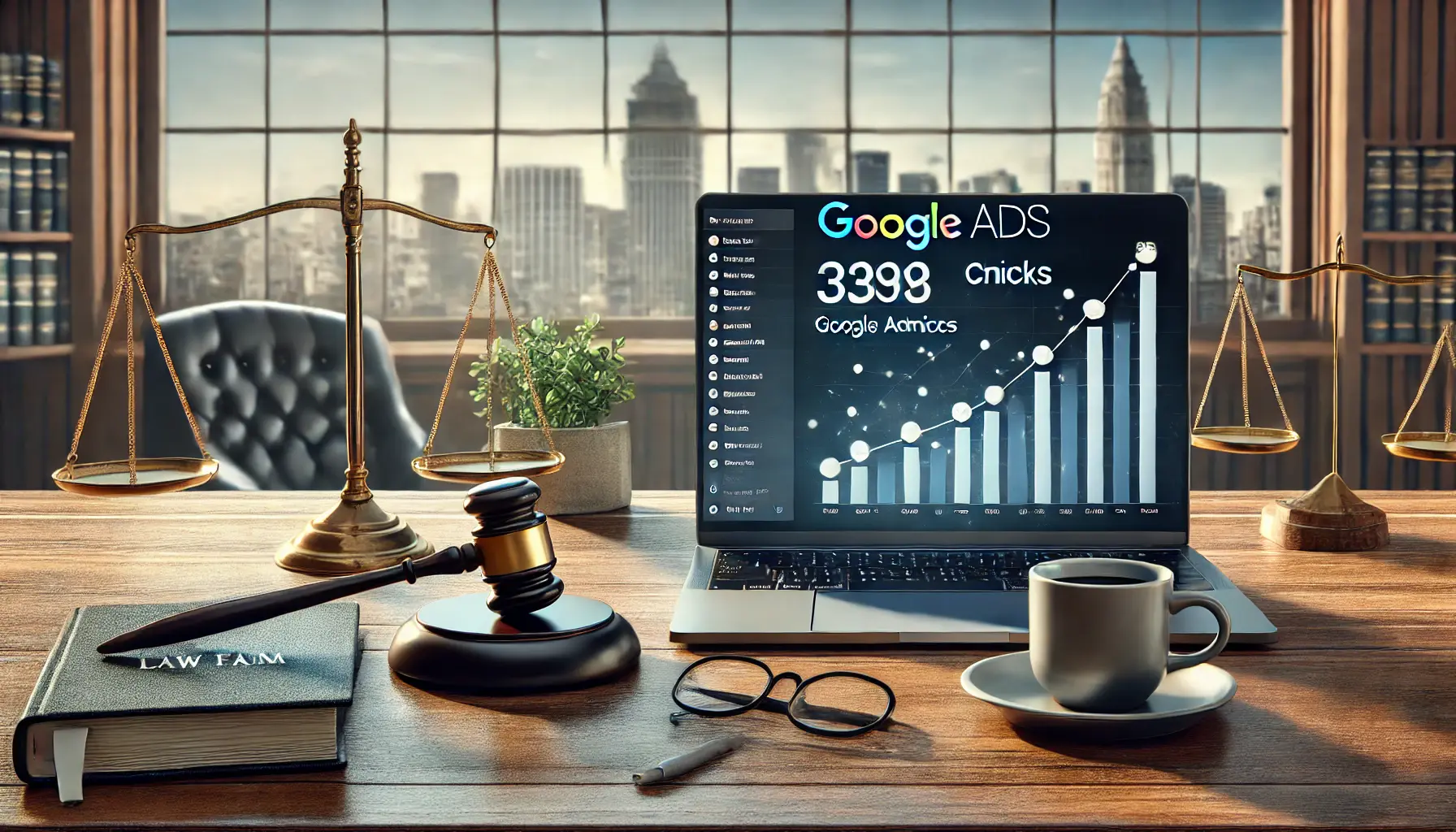
Google Ads brings measurable benefits, improving performance and visibility for law firms.
Benefits of Google Ads for Law Firms
Investing in Google Ads offers several advantages for law firms, making it an indispensable part of modern marketing strategies:
- Attract High-Intent Clients: People searching for legal help are often ready to hire, making them high-intent leads.
- Local Reach: Focus your campaigns on specific geographic areas to target local clients effectively.
- Measurable Results: Google Ads provides detailed analytics, allowing you to track the performance of your campaigns and optimize for better results.

PPC advertising offers a cost-efficient way to reach potential clients with targeted ads.
Pay-Per-Click (PPC) Advertising Explained
One of the key features of Google Ads is the pay-per-click model, where you only pay when someone clicks on your ad.
This ensures that your budget is spent effectively, as you’re only charged for actual engagement.
For lawyers, PPC advertising offers:
- Cost Efficiency: Focus your spending on users genuinely interested in your services.
- Customizable Campaigns: Target specific legal services, such as divorce settlements or corporate law, by customizing your ad campaigns.
- Real-Time Adjustments: Instantly make changes to your campaigns to optimize performance and stay competitive.
Having laid this foundation, you can now build an efficient marketing strategy using Google Ads for your legal practice.
In the next section, we’ll explore how to set up effective ad campaigns to achieve even greater efficiency.
Google Ads provides lawyers with visibility to potential clients actively searching for legal services, making it a powerful tool for law firms to grow their client base.

Setting up Google Ads campaigns involves analyzing performance metrics and choosing effective keywords to target potential clients.
Setting Up Effective Google Ads Campaigns
Establishing a successful Google Ads campaign is essential for lawyers aiming to attract potential clients actively seeking legal services.
By following a structured approach, you can create campaigns that effectively reach your target audience and maximize your return on investment.
Firstly, you have to establish clear objectives for your campaign.
Do you want to increase traffic to your website, gain more consultations, or build brand awareness?
Setting specific goals will guide your strategy and help measure the success of your campaigns.
Determine your target audience by considering factors such as location, demographic information, and the specific legal services you offer.
This will help ensure your ads reach the individuals most likely to need your services.

Choosing the right keywords is a key strategy in optimizing Google Ads campaigns for law firms.
Choosing the Right Keywords
Choosing the right keywords is crucial.
Conduct thorough keyword research to identify terms used by prospective clients when searching for legal advice.
Tools such as Google’s Keyword PlannerA tool provided by Google Ads to help advertisers discover and research keywords for their campaigns. can be invaluable in this process.
Optimize your campaigns with a mix of broad and long-tail keywordsHighly specific keyword phrases that target a niche audience and typically have lower competition. to capture a wide yet relevant audience.
Organize your keywords into tightly themed ad groups.
This structure allows for more precise ad copy targeting and improves your Quality ScoreA metric used by Google Ads to measure the relevance and quality of ads, keywords, and landing pages., which generally leads to lower costs per click and better ad positions.

Creating compelling ad copy is essential for attracting potential clients through Google Ads.
Creating Compelling Ad Copy
Create ad copy that speaks directly to the needs of your audience.
Emphasize unique selling points, such as years of experience, areas of specialization, or client testimonials.
Ensure your ad copy includes a clear call to action that encourages potential clients to contact you or visit your website.

Setting a realistic budget is crucial for optimizing the effectiveness of Google Ads campaigns.
Setting a Realistic Budget
Set a realistic budget that aligns with your goals and the competitiveness of your chosen keywords.
Remember, Google Ads operates on a pay-per-click model, so you only pay when someone clicks on your ad.
Regularly monitor your spending to ensure a good return on investment.
Tracking conversions allows law firms to measure the effectiveness of their Google Ads campaigns.
Tracking Conversions
Track conversions to measure the true effectiveness of your ads.
Set up tracking for actions such as form submissions, phone calls, or appointment bookings.
Analyzing this data will help you understand what’s working and what needs adjustment.
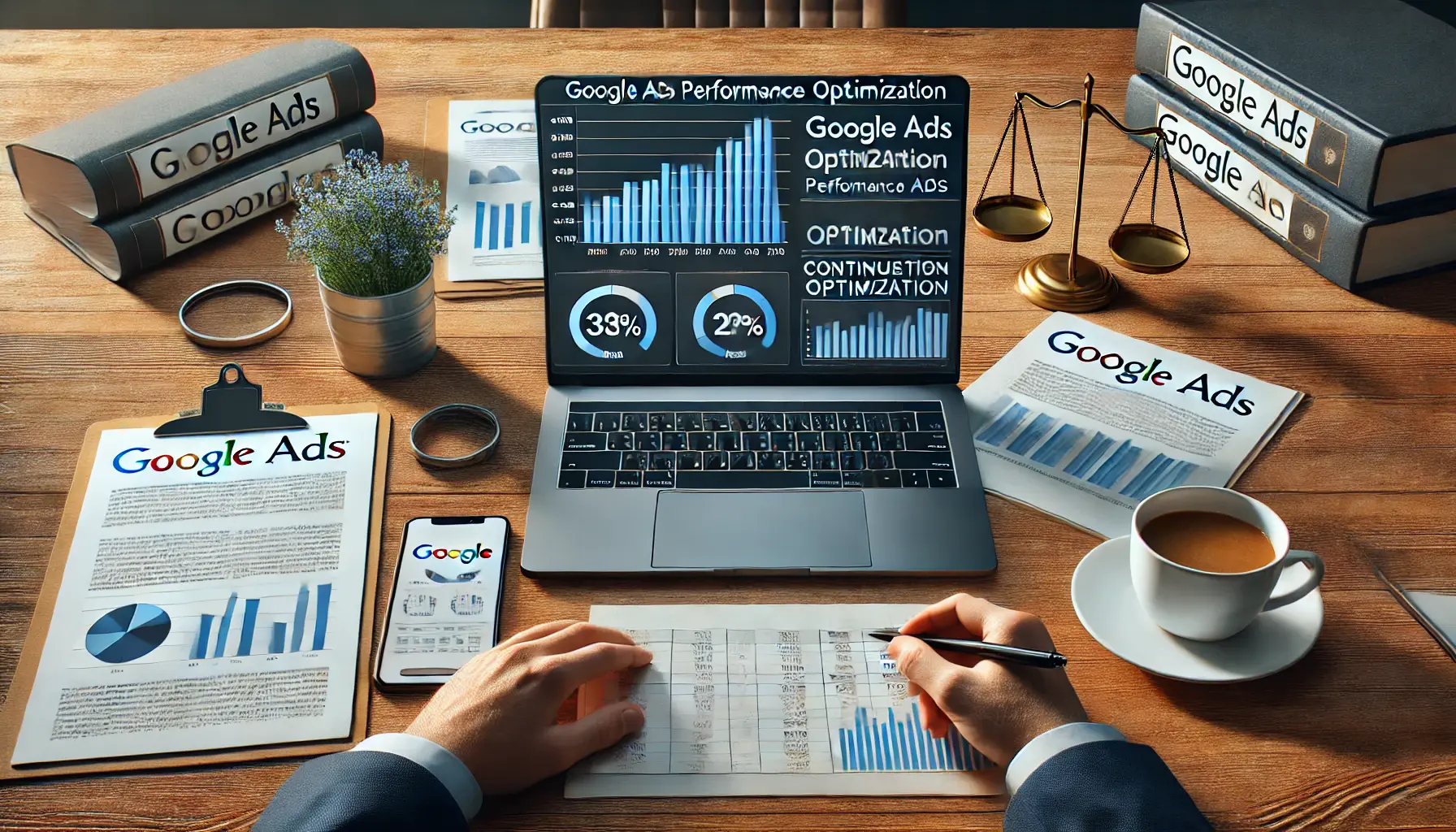
Continuous optimization is key to maximizing the effectiveness of Google Ads campaigns.
Continuous Optimization
Finally, continuously optimize your campaigns.
Regularly review key performance metrics, make data-driven decisions, and refine your strategy.
This may include adjusting bids, testing new ad copy, or refining your keyword list.
By properly setting up and maintaining your Google Ads campaigns, you can effectively reach individuals searching for legal services, build a larger client base, and increase the online visibility of your firm.
Structured campaigns with clear objectives, precise targeting, and optimized keywords are essential for maximizing the effectiveness of Google Ads for lawyers.

Optimizing Google Ads performance involves analyzing and adjusting campaigns based on detailed metrics.
Optimizing Google Ads Performance
Once your Google Ads campaigns are up and running, continuous optimization is essential to ensure they deliver the best possible results.
For lawyers, this means refining your approach to attract more qualified leads and maximize your return on investment.

Monitoring and analyzing key campaign metrics helps law firms optimize their Google Ads performance.
Monitoring and Analyzing Campaign Metrics
Regularly reviewing your campaign’s performance metrics is crucial.
Key indicators to monitor include:
- CTR (Click-Through Rate): Measures how often your ads are clicked compared to how often they are shown. A high CTR indicates that your ad resonates with your audience.
- Conversion Rate: Tracks the number of users who take an ideal action, such as submitting a contact form or calling your office, after clicking your ad.
- Cost Per Click (CPC): Indicates the average cost paid per click. Monitoring CPC helps you manage your budget effectively.
- Quality Score: Google’s rating of the relevance and quality of your keywords and ads. A higher Quality Score can lead to lower costs and better ad placements.
Using tools such as Google Analytics can provide richer insights into user behavior on your website, helping you identify areas for improvement.
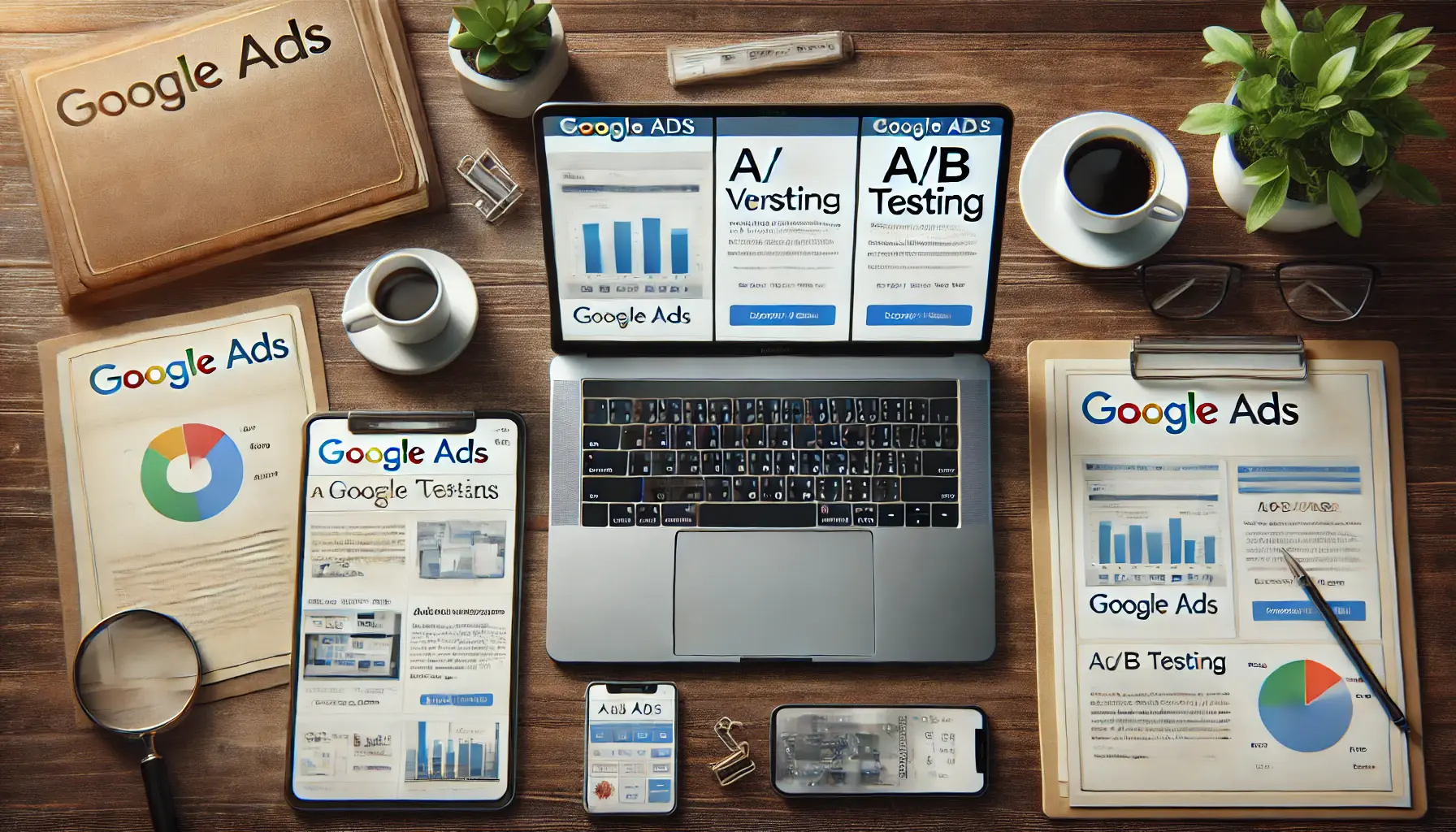
A/B testing ad variants helps refine Google Ads to maximize performance and engagement.
A/B Testing Ad Variants
Running A/B tests enables you to compare two versions of your ads to determine which performs better.
Consider testing the following elements:
- Headlines: Experiment with different messages to see what captures attention.
- Descriptions: Highlight various services or benefits to determine what appeals most to potential clients.
- Calls to Action (CTA): Test different prompts to find what drives more engagement.
Analyzing the results of these tests helps refine your ads and improve their connection with your target audience.

Adjusting bidding strategies is essential for optimizing Google Ads campaigns and controlling ad spend.
Adjusting Bidding Strategies
Optimizing your bidding strategy is vital for controlling costs and improving ad performance.
Consider the following approaches:
- Manual Bidding: Gives you full control over how much you want to pay per click, allowing adjustments based on keyword performance.
- Automated Bidding: Enables Google to automatically adjust your bids to optimize for campaign goals, such as conversions or clicks.
Regularly evaluate your bidding strategy to ensure it aligns with your objectives and market conditions.
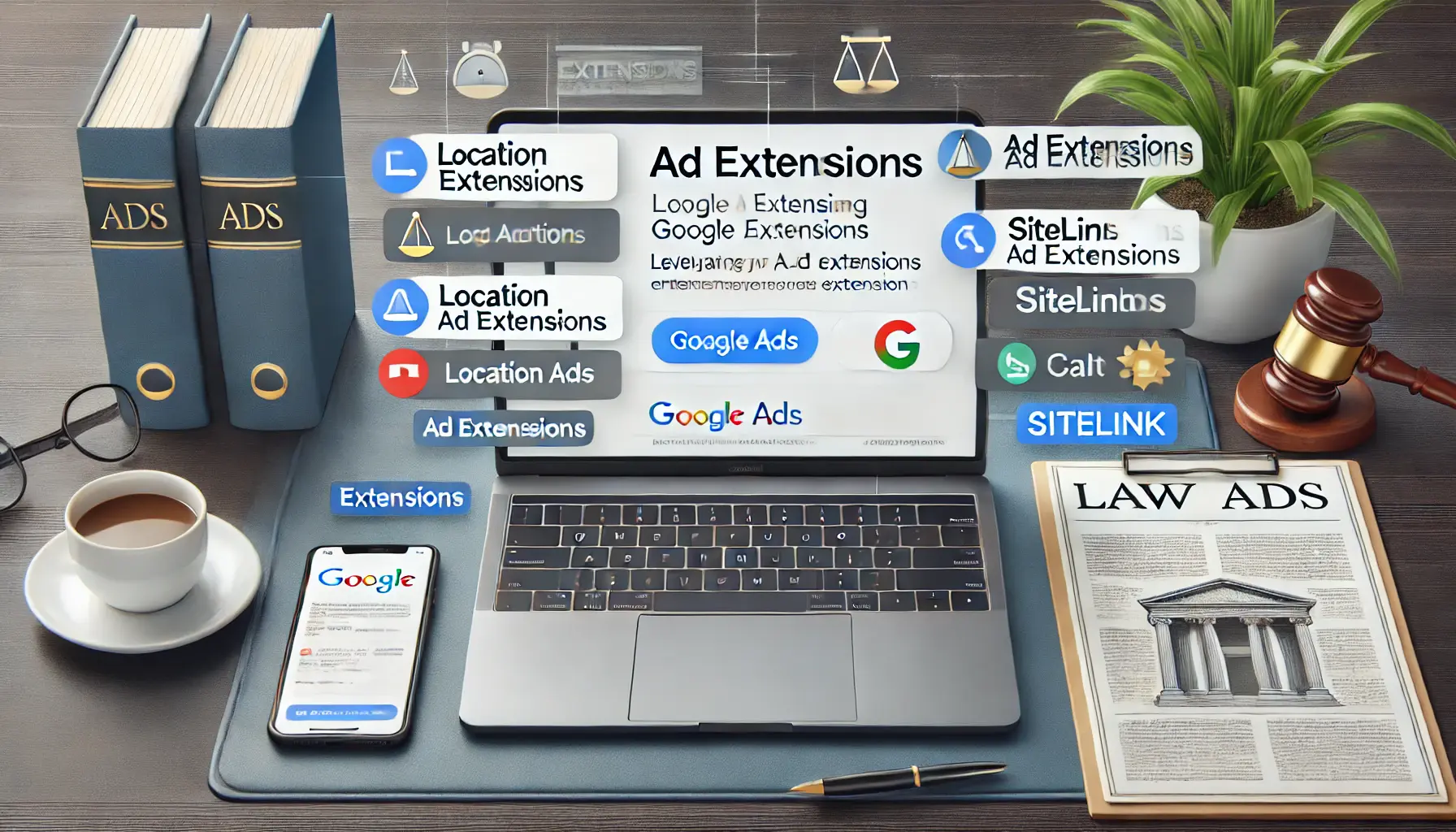
Leveraging ad extensions enhances the visibility and effectiveness of Google Ads campaigns.
Leverage Ad Extensions
Enhance your ads with ad extensionsAdditional information that can be added to Google Ads, such as phone numbers, site links, or locations, to enhance ad visibility., which increase visibility and provide additional information to potential clients.
Useful ad extensions for law firms include:
- Location Extensions: Display your office address, making it easier for local prospects to find you.
- Call Extensions: Add a phone number that allows users to call you directly with a single click.
- Sitelink Extensions: Include links to specific pages on your website, such as practice areas or contact forms.
Implementing these extensions can increase your ad’s effectiveness and improve click-through rates.

Refining audience targeting is essential for optimizing Google Ads and reaching the most relevant clients.
Refining Audience Targeting
Ensure your ads reach the most relevant audience by:
- Geographic Targeting: Focus on specific locations where you offer services to attract local clients.
- Demographic Targeting: Tailor your ads based on factors like age, gender, or household income to reach your ideal client profile.
- Remarketing: Re-engage users who have previously visited your website, keeping your services top of mind.
By refining your targeting, you can increase the relevance of your ads and boost the likelihood of conversions.
Continuous optimization of your Google Ads campaigns will help your law firm remain competitive in the digital space, effectively reach more clients, and maximize the return on your marketing investment.
Continuous monitoring, A/B testing, and bid adjustments can significantly enhance the performance and ROI of your Google Ads campaigns.

Ethical and legal guidelines are crucial for law firms when advertising their services.
Ethical and Legal Considerations in Lawyer Advertising
When utilizing Google Ads for lawyers, it’s imperative to adhere to ethical and legal standards to maintain professionalism and avoid potential sanctions.
Understanding the guidelines set forth by regulatory bodies ensures that your advertising efforts are both effective and compliant.

The American Bar Association (ABA) guidelines ensure ethical compliance in lawyer advertising.
American Bar Association (ABA) Guidelines
The American Bar Association has established the Model Rules of Professional Conduct, specifically Rules 7.1 through 7.3, which govern lawyer advertising.
These rules emphasize that:
- Truthfulness: Advertisements must not be false or misleading. Lawyers are prohibited from making unsubstantiated claims or creating unjustified expectations.
- Communication of Fields of Practice: Lawyers may communicate their areas of practice but should avoid stating or implying specialization unless certified by an appropriate organization.

State-specific regulations ensure compliance in lawyer advertising within different jurisdictions.
State-Specific Regulations
In addition to the ABA’s guidelines, each state has its own set of rules governing legal advertising.
For instance:
- California: Imposes specific requirements on advertising content, including disclaimers and restrictions on testimonials.
- Florida: Requires that all advertisements be filed with the state’s bar association for review prior to dissemination.
It’s essential to familiarize yourself with the regulations in your jurisdiction to ensure full compliance.
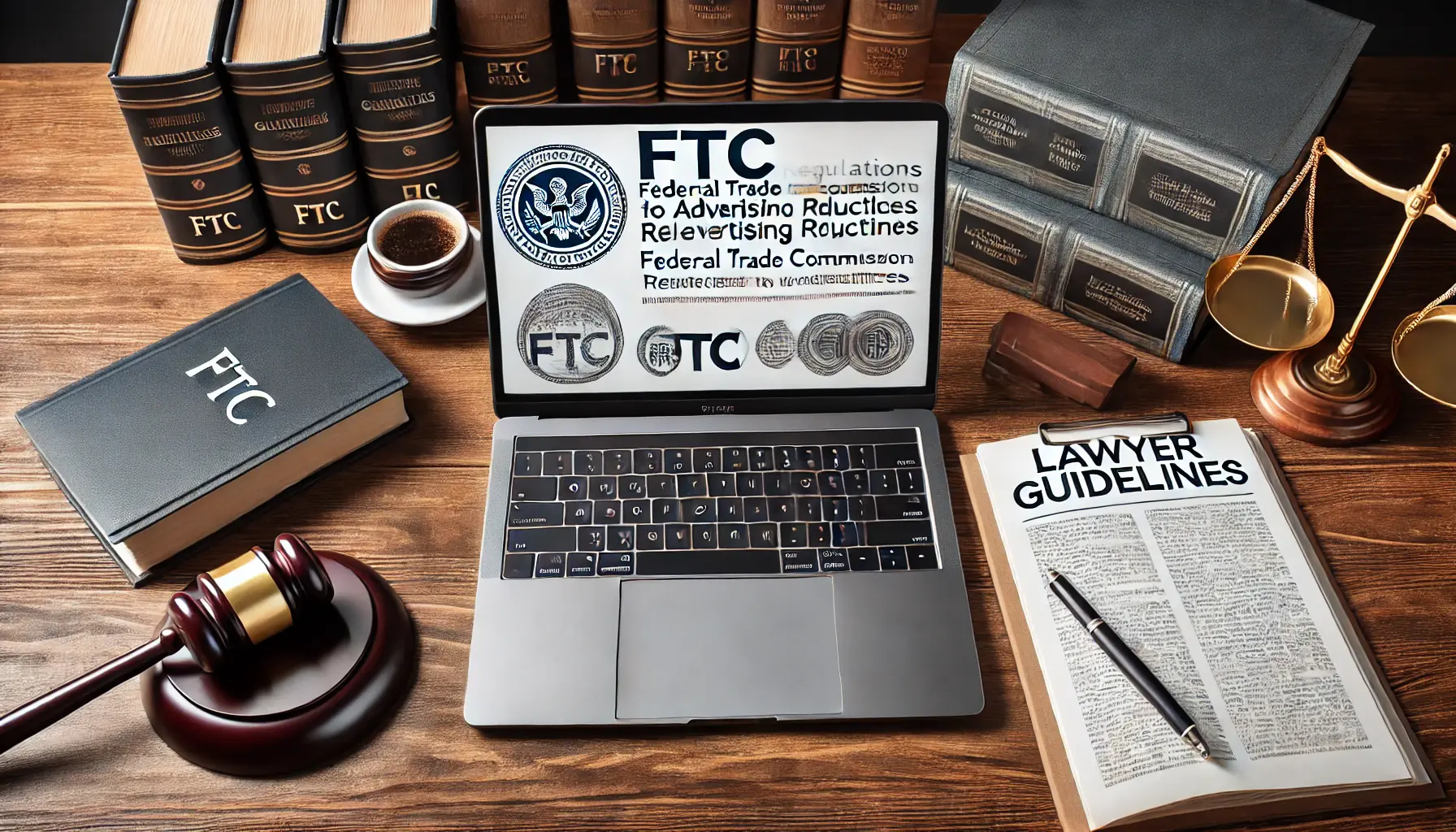
FTC regulations ensure fair and truthful advertising practices for law firms.
Federal Trade Commission (FTC) Regulations
The Federal Trade Commission oversees advertising practices to protect consumers from deceptive or unfair acts.
Recent updates include:
- Online Reviews: The FTC has implemented rules against purchasing fake reviews or manipulating online ratings, with fines of up to $51,744 per violation.
Law firms must ensure that any testimonials or reviews used in advertisements are genuine and not incentivized in a misleading manner.

Ethical advertising practices are essential for maintaining professionalism and trust in law firm marketing.
Best Practices for Ethical Advertising
To maintain ethical standards in your advertising campaigns:
- Truthful Advertising: All statements about your services must be truthful and verifiable.
- No Misleading Comparisons: Your services cannot be compared to other lawyers’ services unless the comparison is factually substantiated.
- Use Disclaimers When Necessary: If an advertisement touts the results of your cases, it must state that past results do not necessarily guarantee future results.
These ethical and legal considerations, if followed, will help lawyers market themselves effectively through Google Ads while maintaining credibility as legal professionals.
Compliance with ABA guidelines, state-specific regulations, and FTC standards is essential for maintaining professionalism in legal advertising.

Successful Google Ads campaigns drive measurable results for law firms.
Case Studies: Successful Google Ads Campaigns for Law Firms
Implementing Google Ads for lawyers has proven to be an effective strategy for increasing visibility and attracting potential clients.
Let’s explore some real-world examples where law firms have achieved significant success through well-executed Google Ads campaigns.

A Google Ads campaign helps an immigration law firm stand out in a competitive market like New York City.
1. New York City Immigration Law Firm
An immigration law firm based in New York City partnered with a marketing agency to increase online exposure.
By targeting keywords such as ‘immigrant lawyer near me’ and ‘best immigration lawyer NYC,’ the campaign delivered remarkable results:
- Over 100,000 impressions within 90 days.
- More than 1,200 clicks, leading to dozens of conversions.
- A 41% increase in impressions compared to the previous period.
- An 81% increase in conversions, demonstrating the effectiveness of combining Google Ads with content marketing strategies.
Source: Marketing360 Case Study
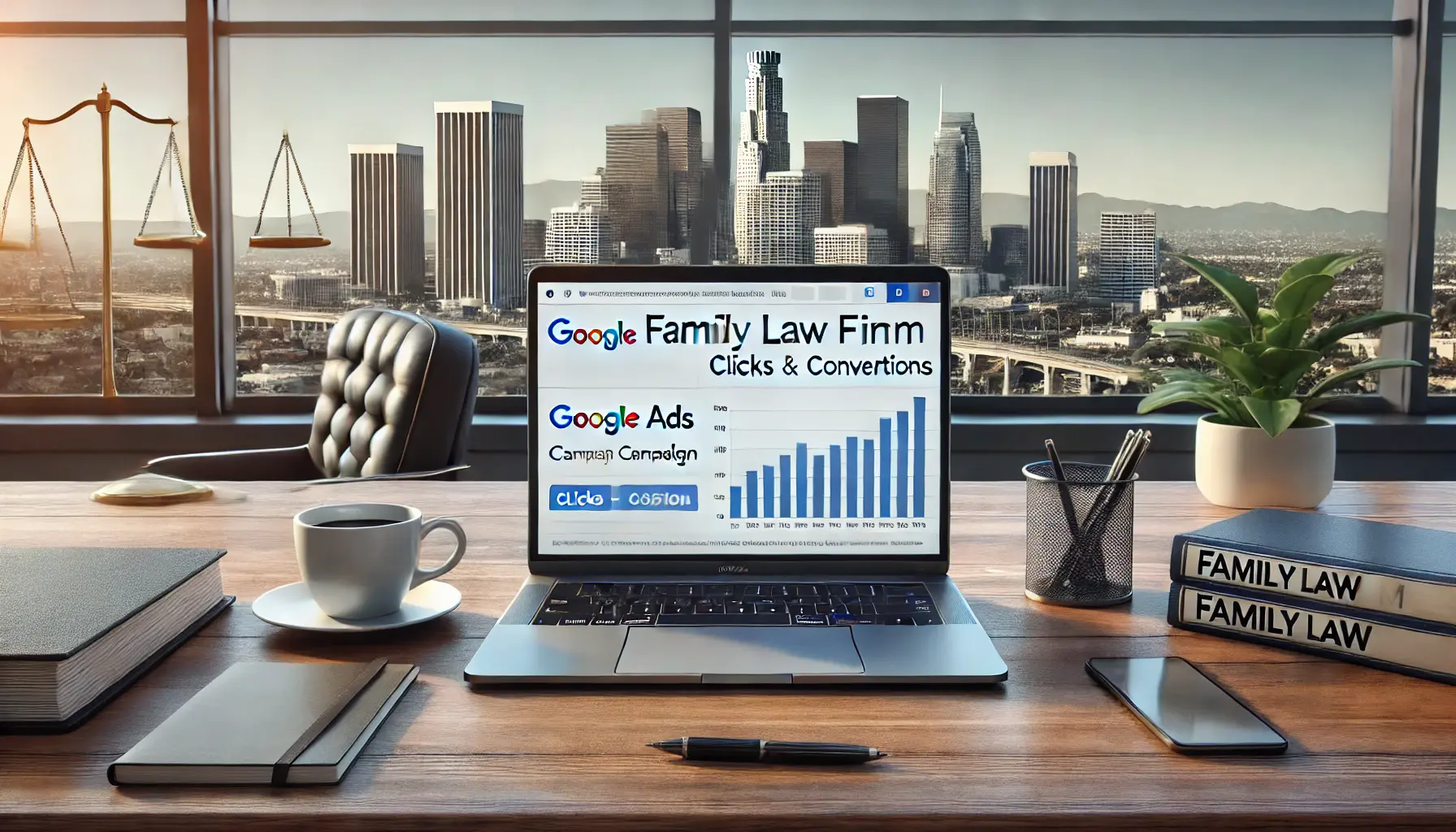
A Google Ads campaign helps a family law firm stand out in the competitive Los Angeles market.
2. Los Angeles Family Law Firm
A family law firm in Los Angeles sought to attract more clients in the competitive Beverly Hills area.
The firm implemented a Google Ads search campaign using the following strategies:
- Defined a 10-mile radius around the firm’s office for targeted advertising.
- Designed ad groups for specific practice areas, such as divorce, spousal support, and prenuptial agreements.
- Created multiple ads for each ad group to enable continuous split-testing.
- Added ad extensions, including phone number extensions and sitelinks to relevant website pages.
This structured approach helped the firm effectively reach potential clients searching for family law services within the targeted geographic boundary.
Source: Interactually Case Study
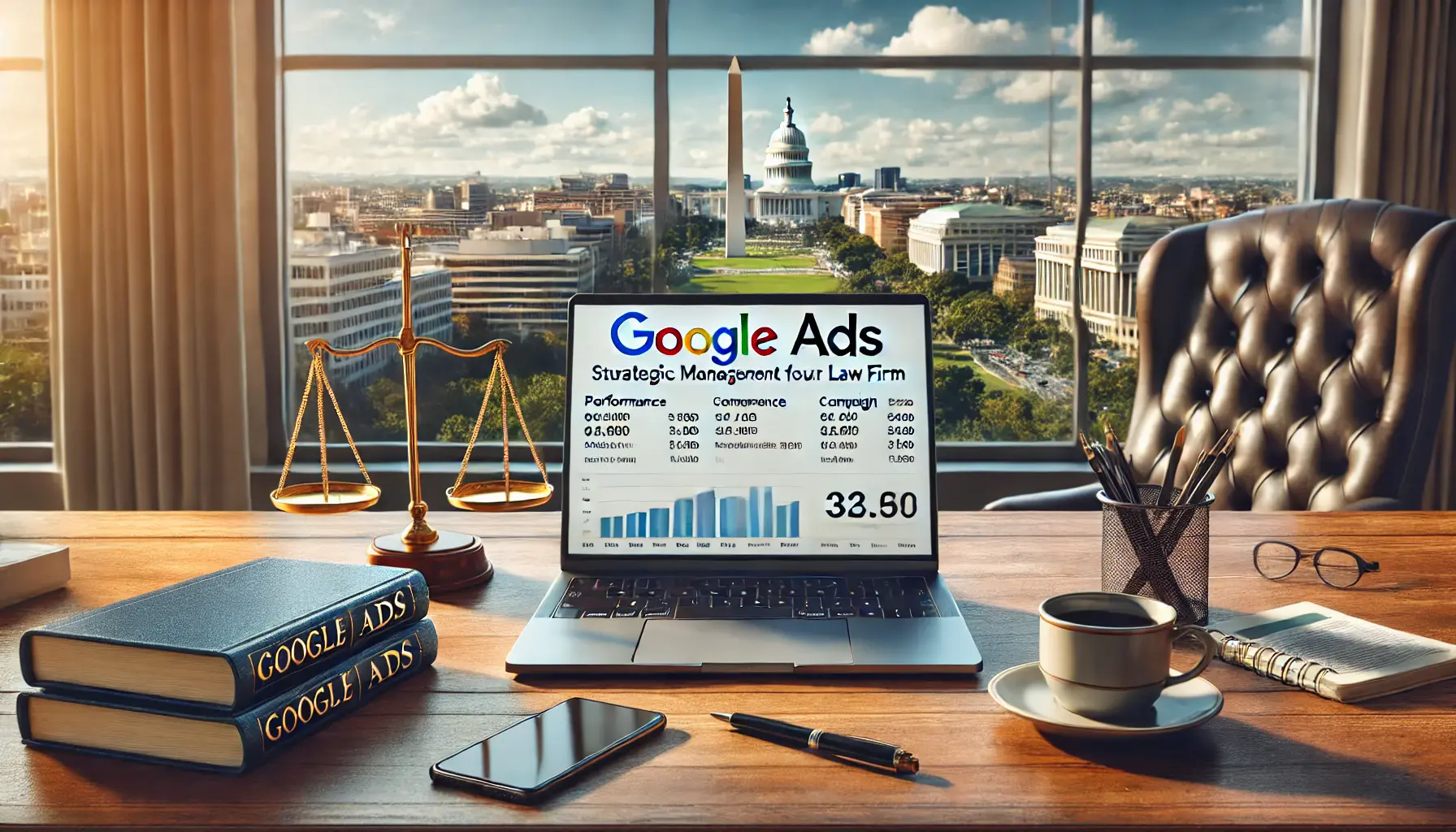
A Google Ads campaign helps a Washington-based law firm achieve better visibility and client engagement.
3. Washington-Based Law Firm
A Washington-based law firm partnered with a marketing service to enhance its online advertising efforts.
As a result, the firm achieved a 17% increase in conversions, showcasing the potential of Google Ads to generate more leads and expand a client base.
Source: Pronto Marketing Case Study
These case studies demonstrate that, when implemented correctly, Google Ads can significantly enhance a law firm’s online presence, drive qualified leads, and contribute to business growth.
By tailoring campaigns to specific practice areas, utilizing precise geographic targetingA feature in digital advertising that allows advertisers to show ads in specific locations to reach a relevant audience., and continuously optimizing ad performance, law firms can effectively achieve their marketing objectives.
Learning from real-world examples demonstrates how targeted Google Ads strategies can deliver impressive results for law firms.
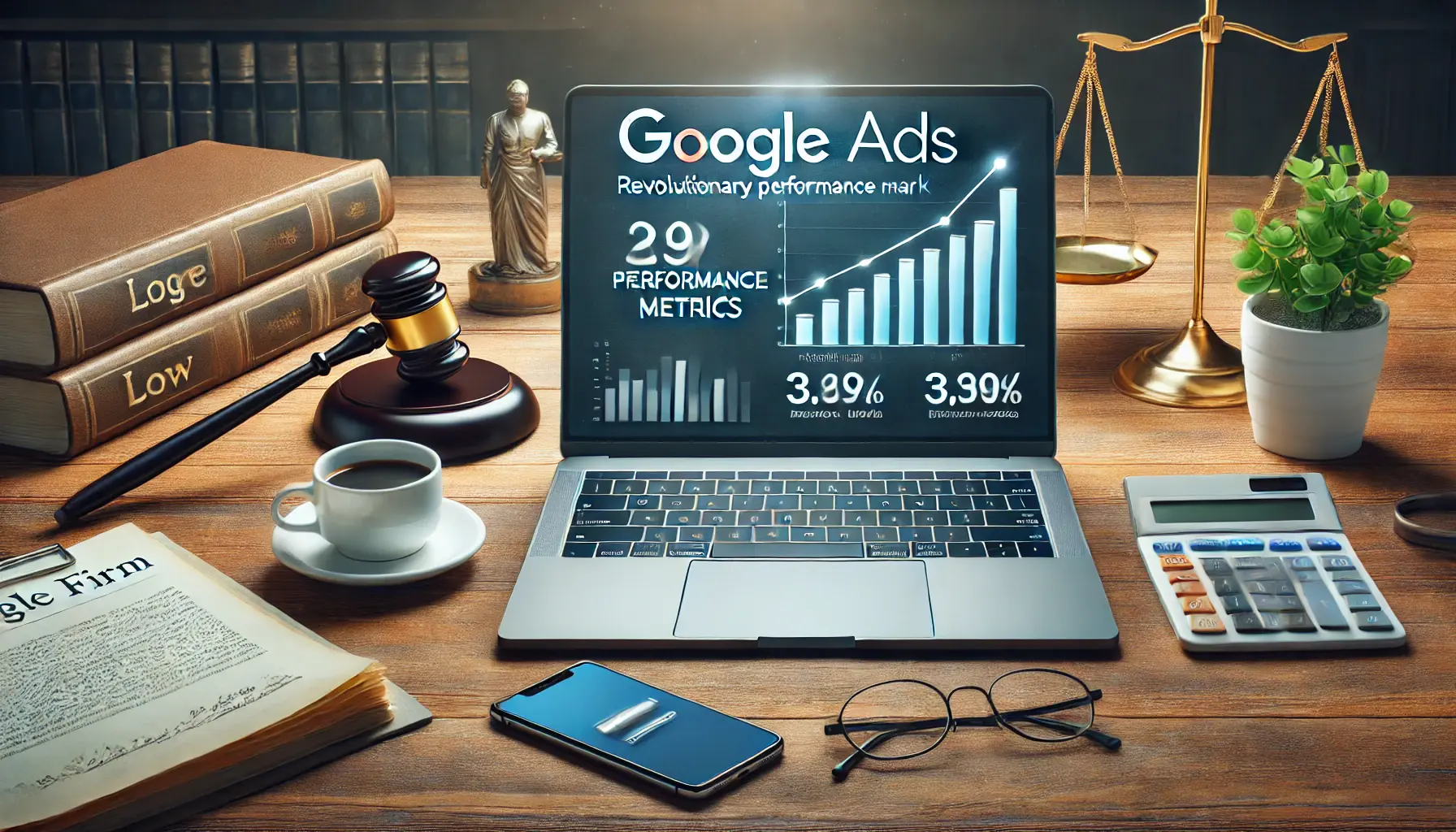
Google Ads has revolutionized the way lawyers and law firms connect with potential clients.
Why Google Ads is Revolutionary for Lawyers

Google Ads empowers law firms by providing a digital competitive edge in the legal industry.
Empowering Lawyers with a Digital Competitive Edge
Google Ads has revolutionized the way lawyers and law firms connect with potential clients in an increasingly digital world.
By leveraging targeted campaigns, legal professionals can establish a strong online presence, enhance their visibility, and ensure their services are accessible to those in need.
The tailored approach of Google Ads provides the perfect platform to attract high-intent clients actively searching for legal expertise.

Analyzing key insights helps law firms optimize their Google Ads campaigns and make data-driven decisions.
Key Insights from the Article
This article has discussed critical elements that can provide a competitive edge in using Google Ads for lawyers.
Key takeaways include:
- The Concept of Google Ads: Understanding the basics of pay-per-click (PPC) advertising and keyword targeting to build effective campaigns.
- Setting Up Campaigns: Articulating clear goals, selecting appropriate keywords, and crafting compelling ad copy.
- Optimizing Performance: Continuous monitoring, A/B testing, and refining bidding strategies to maximize return on investment.
- Maintaining Ethical Standards: Adhering to the American Bar Association guidelines, state-specific regulations, and Federal Trade Commission rules to safeguard credibility and compliance.
- Learning from Case Studies: Real-world examples highlight how well-executed Google Ads campaigns drive client acquisition and business growth.

Google Ads offers significant benefits, such as improved visibility and performance for law firms.
The Benefits of Google Ads for Lawyers
Integrating Google Ads into a law firm’s marketing strategy offers several advantages.
Lawyers can:
- Increase visibility and reach a broader audience by appearing at the top of search results.
- Attract clients actively seeking legal services in specific practice areas.
- Maximize marketing efficiency through measurable results and real-time optimization.
- Leverage geographic and demographic targeting to focus on the most relevant audience.

Final thoughts involve evaluating the overall success and impact of a law firm’s Google Ads campaign.
Final Thoughts
With the strategic use of Google Ads, lawyers can navigate the digital marketing landscape more effectively, grow their practices, and strengthen client engagement.
The insights shared in this article empower legal professionals to confidently harness the full potential of Google Ads.
Each step—setting up campaigns, optimizing performance, and adhering to ethical guidelines—is crucial to achieving marketing success.
Google Ads for lawyers is not just a tool—it is a transformative approach that enables law firms to succeed in today’s competitive marketplace.
Through thoughtful planning and consistent effort, lawyers can build sustainable relationships with clients while ensuring their services remain accessible and impactful in a digital-first world.
Google Ads empowers law firms with tools to effectively compete in the digital marketplace by connecting with high-intent clients.
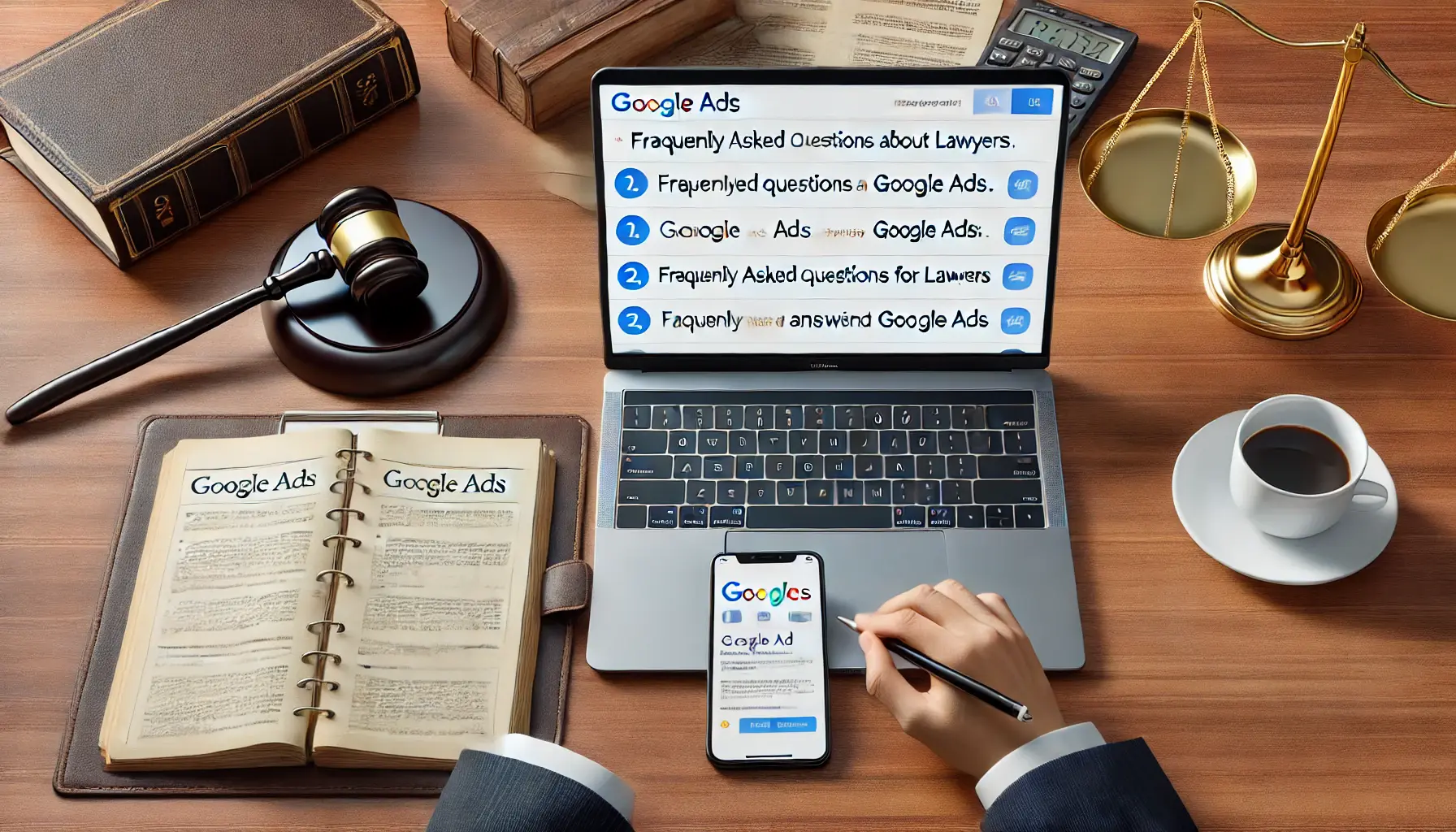
Addressing frequently asked questions helps law firms optimize their Google Ads campaigns effectively.
Your campaigns can be managed by an agency specialized in Google Ads, check out our service page.
Frequently Asked Questions About Google Ads for Lawyers
Google Ads is an online advertising platform that allows businesses, including lawyers, to display their ads on Google’s search engine and affiliated websites.
It helps drive targeted traffic to your website and increase online visibility.
Setting a budget for Google Ads can be tricky, especially in the legal industry where keywords are costly.
Legal keywords like “personal injury lawyer” can be expensive due to high competition and demand.
Google Ads offers immediate exposure, allowing your law firm to appear at the top of search results instantly.
This significantly increases visibility and attracts potential clients actively searching for legal services.
Google Ads operates on a pay-per-click (PPC) model, where you pay only when someone clicks on your ad.
By targeting specific legal keywords, your ads appear in search results when potential clients search for those terms.
Yes, Google Ads can be highly effective for law firms.
They enable you to connect with individuals actively searching for legal services, offering a competitive edge in reaching potential clients in real-time.
Law firms can use various types of Google Ads, including Search Ads, Display Ads, Video Ads, and Local Services Ads.
Each type is tailored to different objectives and helps in reaching potential clients effectively.
Success is measured by monitoring key performance indicators like click-through rates (CTR), conversion rates, and return on investment (ROI).
Regular analysis helps refine strategies and improve campaign performance.
Yes, lawyers must adhere to ethical guidelines.
Advertisements should be truthful, not misleading, and comply with legal advertising standards to maintain credibility and professionalism.
Yes, Google Ads allows you to target specific geographic locations.
This enables your law firm to focus on potential clients in your service areas, increasing the relevance and effectiveness of your ads.
